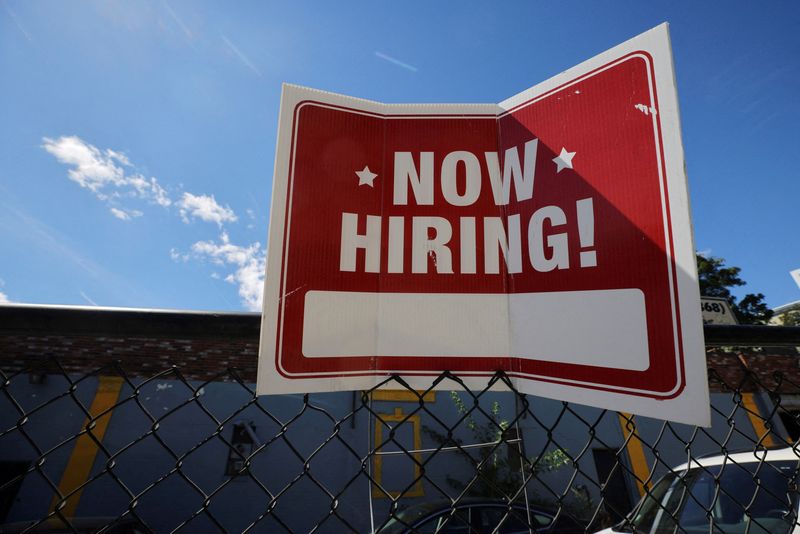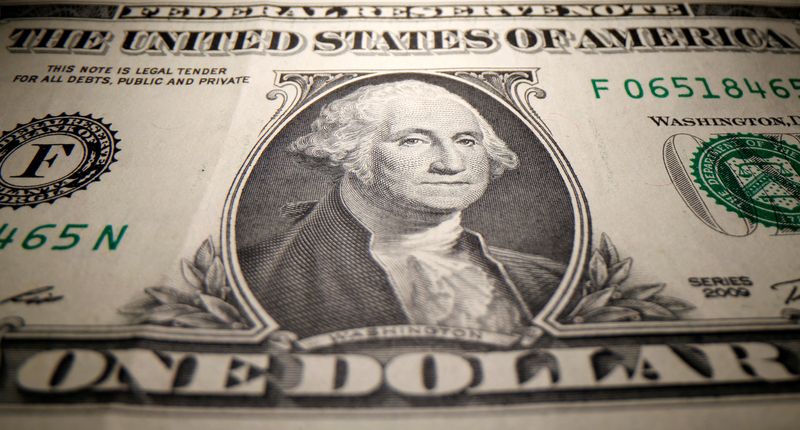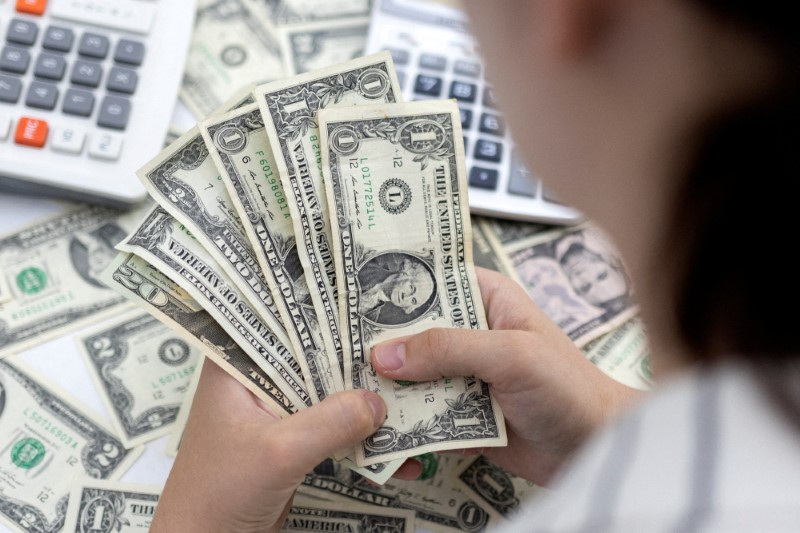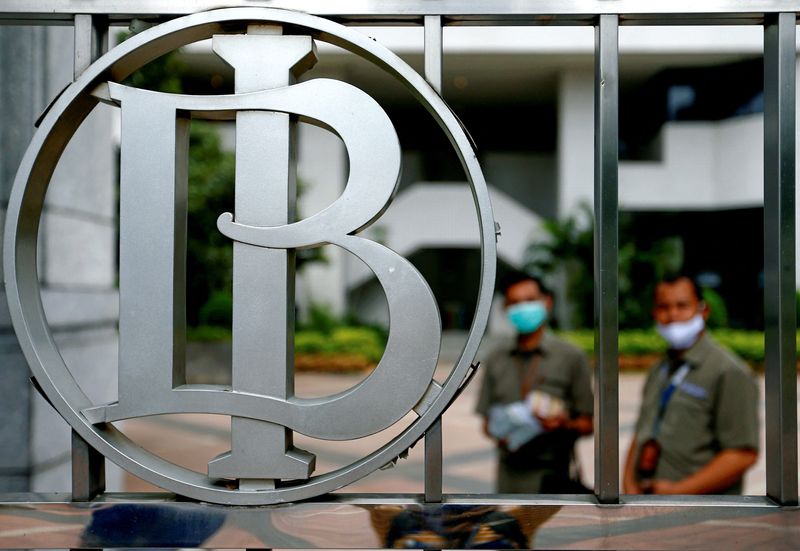Select Language

By Lucia Mutikani
WASHINGTON (Reuters) - U.S. job growth likely moderated in December, while the increase in annual wages probably slowed to below 4% for the first time in 2-1/2 years, potentially drawing the Federal Reserve a step closer to start cutting interest rates.
The closely watched employment report from the Labor Department on Friday is also expected to show the unemployment rate edging up to 3.8% last month from 3.7% in November. Easing labor market conditions would add to data last month showing inflation ebbing significantly in November and could cement financial market expectations for a rate cut in March.
The report would also indicate that the economy avoided a recession last year and would likely continue to grow through 2024 as labor market resilience supports consumer spending.
"Right now, employers are hiring to keep the doors open, rather than to expand, but they're also not letting workers go," said Elizabeth Crofoot, a senior economist at Lightcast in Washington. "That's close to the 'Goldilocks' job market that the Fed has been trying to achieve."
Nonfarm payrolls likely increased by 170,000 jobs last month after rising 199,000 in November, according to a Reuters survey of economists. Baring any revisions to October and November's payrolls counts, this would mean the economy added roughly 2.722 million jobs in 2023, a sharp step-down from the 4.793 million positions created in 2022.
That reflects cooling demand for both labor and in the economy following 525 basis points worth of rate hikes from the U.S. central bank since March 2022.
Roughly 100,000 jobs per month are needed to keep up with growth in the working age population.
Unseasonably mild weather likely boosted hiring at construction sites last month, while employment in the motion picture and sound recording industries is expected to rise further as disruptions from the since ended strikes fade.
Retail employment is a wild card amid conflicting signals on the holiday shopping season.
DANGER LURKING?
But danger could be lurking beneath the seemingly resilient labor market. Job growth in recent months has been largely concentrated in less than a handful of sectors, including leisure and hospitality as well as healthcare.
Government hiring as state and local governments try to bring education staffing back to pre-pandemic levels has also been driving employment gains.
Government payrolls growth has averaged 63,800 per month since July. Some economists said this indicated that the labor market was not as strong as the numbers suggested. Nonetheless, most do not expect a recession this year, but lackluster growth.
"The rest of the industries have not been hiring people very much at all," said Sung Won Sohn, finance and economics professor at Loyola Marymount University in Los Angeles. "We are going to have a 'soft landing' but that hides the pain."
Goldman Sachs economist Manuel Abecasis was, however, less concerned, noting that the three industries that have dominated hiring accounted for 40% of employment.
"The industries accounting for 70% of total employment have continued to add jobs on net," said Abecasis. "Looking ahead, we expect total labor demand to continue to ease gradually but the breadth of hiring to widen somewhat."
Financial markets are betting the Fed will begin cutting rates as early as March. Those expectations could get more mileage, with average hourly earnings expected to increase 0.3% in December after rising 0.4% in the prior month.
That would lower the year-on-year increase in wages to 3.9%, the smallest since June 2021, from 4.0% in November.
The central bank held its policy rate steady in the current 5.25%-5.50% range last month and policymakers signaled in new economic projections that the historic monetary policy tightening engineered over the last two years is at an end and lower borrowing costs are coming in 2024.
With December's employment report, the government will incorporate annual revisions to the seasonally adjusted household survey data, from the which the unemployment rate is derived, for the past five years.
The revisions typically have little impact on the jobless rate or the labor force participation rate.
There has been an influx of people into the labor force, some of it tied to a rise in immigration. The expanding labor pool is curbing wage growth and lifting the unemployment rate, which has risen from a five-decade low of 3.4% in April.
"We are certainly getting in the territory where, when incorporating productivity, wage growth is more consistent with the Fed's 2% target," said Sam Bullard, a senior economist at Wells Fargo in Charlotte, North Carolina.

By Neil Jerome Morales and Mikhail Flores
MANILA (Reuters) - Philippine inflation slowed to its weakest in nearly two years in December but full-year readings remained outside the central bank's target zone, diminishing chances of near-term rate cuts.
The central bank did not waver on Friday from its stance in early December that policy settings would stay "sufficiently tight", underscoring concerns about inflation despite a slowdown in the pace of price gains.
The consumer price index in December rose 3.9% from a year earlier compared with 4.1% in November, the statistics agency said on Friday, the slowest since February 2022 and the third straight month that inflation has eased.
That brought the 2023 average inflation rate to 6.0%, still way outside the central bank's 2%-4% target.
"The Monetary Board deems it necessary to keep monetary policy settings sufficiently tight until a sustained downtrend in inflation becomes evident," the Bangko Sentral ng Pilipinas (BSP) said in a statement following the data.
"The BSP will continue to monitor inflation expectations and second-round effects and take appropriate action as needed to bring inflation back to the target," it added.
Economists in a Reuters poll had forecast annual inflation of 4.0% in December, within the central bank's 3.6% to 4.4% projection for the month.
Core inflation, which strips out volatile food and energy prices, was at 4.4% in December versus 4.7% in the previous month.
Among the main contributors to slower inflation was a decline in food inflation to 5.5% in December from 5.8% in November, the statistics agency said.
The central bank kept its benchmark interest rate steady at 6.5% for a second straight meeting in December, after a series of rate increases to rein in inflation, including an off-cycle hike in October.
It meets for the first time this year on Feb. 15.
"We think that the BSP has sufficiently tightened despite additional supply side risks," said Domini Velasquez, chief economist at China Banking Corp in Manila.
"However, even if the BSP stands pat, which is the likely scenario, we think that the central bank will not be in a hurry to cut rates due to the risks," added Velasquez, who has penciled in rate cuts by the second half of 2024.

By Ankur Banerjee
SINGAPORE (Reuters) - The dollar was steady on Friday, heading for its strongest weekly performance since July on scaled back expectations of steep and early interest rate cuts this year ahead of closely watched U.S. payrolls data later in the day.
U.S. private employers hired more workers than expected in December, data showed on Thursday, pointing to persistent strength in the labour market that should continue to sustain the economy.
That helped the dollar shrug off weakness and against a basket of currencies, the U.S. currency was last at 102.39 in early trade on Friday. The dollar index is up 1% for the week, its strongest performance since the week ending July 23.
The dollar's rebound will be tested by the nonfarm payrolls report due later in the session. Economists polled by Reuters forecast that 170,000 jobs were created in December, fewer than the 199,000 in November.
"The USD strength we are seeing at the start of 2024 may have more to do with safe-haven demand as equity markets have struggled and market volatility has increased," said Hamish Pepper, fixed income and currency strategist at Harbour Asset Management.
Traders have dialled back rate cut bets, with markets now pricing in a 65% chance of a rate cut in March, compared to 86% chance a week earlier, CME FedWatch tool showed. They are also pricing in less than 140 basis points of cuts this year versus 160 basis points at the end of December.
Some analysts still see market expectations as too aggressive.
The dollar is likely to be supported by an increase in U.S. rates, relative to the rest of the world, as "Fed rate cut expectations prove too aggressive," Pepper said.
"While core PCE inflation has dropped quickly to around 3%, this is not the 2% that the Fed targets and the last mile may require policy rates to stay at more elevated levels for longer than anticipated." Inflation, as measured by the personal consumption expenditures price index, rose 2.6% in the 12 months through November.
The dollar's ascent has seen the Japanese yen weaken considerably this week, with the Asian currency down 2.5% against the dollar, on course for its weakest weekly performance since June.
On Friday, the yen weakened 0.06% to 144.72 per dollar, having touched a more than two-week low of 144.90 earlier in the session.
The euro was last up 0.09% at $1.0953, on track for 0.8% decline in the week, snapping a run of three weeks of gains. Sterling was last at $1.2694, up 0.12% on the day, but still on course for a small decline for the week.
In cryptocurrencies, bitcoin dropped 0.91% to $44,082.61. Ether fell 0.53% to $2,263.75.
========================================================
Currency bid prices at 0123 GMT
Description RIC Last U.S. Close Pct Change YTD Pct High Bid Low Bid
Previous Change
Session
Euro/Dollar $1.0952 $1.0944 +0.08% -0.77% +1.0956 +1.0945
Dollar/Yen 144.7850 144.6550 +0.10% +2.66% +144.8900 +144.6600
Euro/Yen 158.56 158.27 +0.18% +1.88% +158.6700 +158.2800
Dollar/Swiss 0.8492 0.8502 -0.12% +0.90% +0.8504 +0.8492
Sterling/Dollar 1.2690 1.2682 +0.07% -0.27% +1.2695 +1.2680
Dollar/Canadian 1.3353 1.3350 +0.03% +0.73% +1.3359 +1.3349
Aussie/Dollar 0.6707 0.6707 +0.01% -1.62% +0.6713 +0.6704
NZ 0.6236 0.6236 +0.06% -1.25% +0.6241 +0.6230
Dollar/Dollar
All spots
Tokyo spots
Europe spots
Volatilities
Tokyo Forex market info from BOJ

(Reuters) - Ukraine's export value fell 18.7% in 2023 compared with 2022, totalling $35.8 billion, the lowest figure recorded in a decade, the country's Economy Minister Yulia Svyrydenko said on Thursday.
Maritime export saw an increase of 30.7% in December compared with November, she said on the LinkedIn platform.
"In total, for the year 2023, we have almost 1 million tons more maritime exports," Svyrydenko added.
Road exports were affected by a blockade of border crossings by protesting Polish truckers, resulting in an 18.3% decline in December compared with November, when the protests started. However, year-on-year the reduction was only 0.7%, Svyrydenko added.
In total, Ukraine exported 99.8 million tons of goods in 2023, 112,000 tons more than in 2022, she added.

By Lewis Jackson
SYDNEY (Reuters) - Electric vehicle (EV) sales in Australia hit an all-time high in 2023, according to the country's automotive association, however light vehicle sales remained dominated by emissions-intensive trucks and sports utility vehicles (SUVs).
Battery-electric vehicles were 7.2% of all vehicles sold last year, more than double the 3.1% recorded in 2022, according to data from the Federal Chamber of Automotive Industries (FCAI) on Thursday.
The sales share for 2023 rises to 16.2% of all new vehicle sales once hybrids and plug-in hybrids are included, almost one in every five vehicles.
After a decade under conservative governments that opposed EV adoption, the current centre-left Labor government, which won power in 2022, has launched a national EV strategy and provided hundreds of millions for clean transport.
Transport is one of Australia's largest sources of emissions and the growing adoption of electric vehicles bolsters the government's pledge to cut emissions by 43% by 2030.
However, Australian's continue to prefer SUVs or light commercial vehicles, models which usually come with higher emissions when fossil fuelled. The two categories accounted for 78.4% of all new vehicle sales last year.
The Ford (NYSE:F) Ranger and Toyota (NYSE:TM) Hi-Lux, the two most popular vehicles and a tenth of all those sold in 2023, tend to emit more carbon dioxide than average.
Efforts to increase the takeup of electric vehicles have long been plagued by shortages, a limited number of models and sparse and sometimes faulty charging equipment.
As a result adoption for many years lagged countries like the US or Britain, where sales of EVs and plug-in hybrids hit 7.7% and 23%, respectively in 2022, according to the International Energy Agency.
Energy Minister Chris Bowen said in November the government would soon release details of its long-awaited fuel efficiency standards, a policy that advocates say will spur manufacturers to send more EVs to Australia and further boost adoption.

By Matt Tracy
(Reuters) - U.S. corporate borrowers are raising nearly $16 billion in high-grade rated bonds on Wednesday, adding to a $29 billion issuance binge on Tuesday, as companies looked to grab strong investor demand ahead of economic data releases.
Among the issuers was Berkshire Hathaway-owned utility Pacificorp, which raised $3.8 billion in bonds that will be used to repay debt and fund settlement claims related to wildfires in Oregon and Northern California.
Other Wednesday deals include $2.5 billion in notes sold by French bank Credit Agricole (OTC:CRARY) and another $2.5 billion by the financing arm of automaker Hyundai (OTC:HYMTF).
"Companies are taking advantage of the ‘January effect’ as investors start to deploy fresh investment capital in the new year after the seasonally quiet back half of December," said Scott Schulte, head of the investment-grade debt syndicate desk at Barclays.
"The push to get deals done early in the week is also motivated by the notion that the meaningful year-end decline in Treasury yields was arguably overdone and key economic data releases later this week risk showing an inflationary surprise," he added.
Wednesday's primary issuance follows a strong Tuesday performance. Sixteen borrowers sold $29.3 billion in bonds, the most since Labor Day last September and the second-best start to a year behind 2023, according to a Wednesday report by BMO Capital Markets.
So far, investor demand has been strong for the new bonds. On Tuesday, the bonds sold were 2.83 times oversubscribed, according to Informa Global Markets.
The busy start to the New Year comes even as high-grade bond spreads widened slightly this week, according to the ICE BofA U.S. Corporate Option-Adjusted Spread Index.
Analysts and investors have mixed outlooks for the U.S. economy. Expected Federal Reserve interest rate cuts have some optimistic the economy is set for a "Goldilocks" soft landing, while others see a mild recession in the cards.
Regardless, investors are buying high-grade bonds in earnest, aiming to lock in yields that may not be available if the Federal Reserve starts to cut U.S. rates later this year.
"What is not a possibility but rather a certainty, in our view, is that yields at multi-decade highs leads to buying of HG credit day in and day out," JPMorgan analysts wrote in their 2024 outlook last month.
This week has seen $45.2 billion in high-grade corporate bond issuance so far, which BMO said could go higher as borrowers previously on the sidelines weigh coming to the market now.

By Jihoon Lee
SEOUL (Reuters) - South Korea's government will put its focus on supporting people's livelihoods and managing risk factors, as it cut the country's 2024 GDP forecast and raised its inflation projection.
In its biannual economic policy plan released on Thursday, the finance ministry expected the economy to grow 2.2% in 2024, down from 2.4% seen in July, after expanding 1.4% in 2023 which was a three-year low.
The ministry expected consumer prices to rise 2.6% this year, up from its previous forecast of 2.3%. In 2023, prices rose 3.6%.
"The economic recovery will be stronger (than last year) amid improvements in global trade and demand for semiconductors, but there will be difficulties in domestic demand and people's livelihoods due to persistently high inflation and interest rates," the ministry said.
The government will primarily focus on economic recovery for the common people, while managing potential risk factors, it said.
South Korea's exports rose for a third straight month in December as demand for chips started to pick up, raising hopes for an economic recovery driven by semiconductor exports.
The country's central bank has maintained its policy interest rate at 3.5%, the highest since late 2008, since the last hike in January 2023, in its continued fight against slowly easing, but still high inflation.
The finance ministry said it aims to bring down inflation, which stood at 3.2% in December, to the 2% level within the first half of 2024, with more policy measures, such as tax and tariff cuts, and freezing public utility costs.
To boost consumption, the government plans to raise tax exemptions on credit card spending and continue efforts to attract more foreign tourists, including the exemption of visa issuance fees for group tourists from China and other Asian countries.
For companies, the ministry said it will introduce new temporary tax cuts on investments in research and development and extend existing tax breaks on facility investments until end-2024.
The ministry said it will expand liquidity support measures if needed to prevent a credit crunch in builders and real estate projects. Last month, a mid-sized builder applied for a debt restructuring, raising concerns over the construction sector.

BEIJING (Reuters) - China's services activity expanded at the fastest pace in five months thanks to a solid rise in new business, a private-sector survey showed on Thursday, lifting the degree of optimism in the sector to a three-month high.
The data, offering a snapshot of business sentiment, was in contrast to an official survey on Sunday which showed a sub-index of services activity shrank again at the end of 2023, raising calls for more stimulus measures in the new year.
The Caixin/S&P Global services purchasing managers' index (PMI) rose to 52.9 in December from November's 51.5, above the 50-mark separating growth from contraction and posting the highest reading since July.
Aided by robust new business which expanded at the fastest rate since May, firms attributed the improvement to rising customer numbers and spending.
"The overall number of customers rose slightly in December compared with November," said a restaurant owner surnamed Jin, based in Hangzhou, a city in eastern Zhejiang province.
"But still, businesses in 2023 were worse than 2022 due to the macro economic trend," Jin said.
Foreign demand for Chinese services also increased last month. Around 214,000 travellers from France, Germany, Italy, the Netherlands, Spain, and Malaysia entered China in December after the visa-free policy took effect, up 28.5% from November, according to the National Immigration Administration.
Improved demand conditions led firms to increase their staffing levels as they planned to meet rising business requirements. A sub-index of employment returned to expansion in December following November's contraction.
Services firms remained upbeat about their business activity in 2024, with the level of positive sentiment increasing to a three-month high, though it was still below the series average.
Taken together with the better-than-expected Caixin manufacturing PMI, the Caixin/S&P's composite PMI rose to 52.6 last month from November's 51.6, the highest reading since May.
The vibrancy in the services sector extended to the new year as travel data suggest an improvement in the number of domestic visitors during the three-day New Year's holiday from Saturday to Monday.
However, the downbeat PMI survey by the National Bureau of Statistics (NBS) suggests the world's second-largest economy is still under pressure as the once-mighty property sector fails to show any meaningful rebound, consumers are tightening their belts and factories have been cutting selling prices.
Analysts interpret the divergence between Caixin PMI and the official PMI as differences in their geographic and sector coverage.
To spur growth, China's central bank made 350 billion yuan ($49.01 billion) in loans to policy banks through its pledged supplementary lending (PSL) facility in December, increasing market bets that China would cut interest rates further.
The NBS will release economic indicators including industrial output and retail sales in coming weeks.
($1 = 7.1417 Chinese yuan renminbi)

By Noel Randewich
(Reuters) - U.S. chip stocks added to a string of losses on Wednesday, with Wall Street's main semiconductor benchmark tumbling from record highs following its strongest year since 2009, when the sector bounced back after the financial crisis.
Drops of over 2% in Advanced Micro Devices (NASDAQ:AMD), Qualcomm (NASDAQ:QCOM) and Broadcom (NASDAQ:AVGO) weighed most on the PHLX semiconductor index, which was down 2.1%.
The chip index has now declined almost 7% since reaching a record high close on Dec. 27.
This week's drop in semiconductor stocks has tracked a broad Wall Street decline as investors await the Federal Reserve's December meeting minutes due later on Wednesday for clues on its interest rate path.
Fueled by optimism about artificial intelligence and more recently by expectations the Fed will cut interest rates this year, the PHLX surged 65% in 2023, its strongest performance since 2009. That compares to annual gains of 43% and 24%, respectively, for the Nasdaq and S&P 500.
Chip stocks have also benefited from bets that a downturn in global demand last year that saw memory chip makers cut production has largely bottomed out.
Nvidia (NASDAQ:NVDA), viewed as the top provider of AI-related chips, saw its stock market value more than triple in 2023 to $1.2 trillion, making it Wall Street's fifth most valuable company. It dipped almost 1% on Wednesday.
In a client note, BofA Global Research analyst Vivek Arya recommended exposure to cloud computing and cars through stocks including Nvidia, Marvell (NASDAQ:MRVL) Technology, NXP Semiconductors (NASDAQ:NXPI) and ON Semiconductor (NASDAQ:ON). Arya also recommended stocks including KLA Corp and Arm Holdings (NASDAQ:ARM) for exposure to the increasing complexity of chip designs.
In another note, Wells Fargo analyst Joe Quatrochi said he expects a muted recovery for chip equipment sellers in 2024, and pointed to KLA and Applied Materials (NASDAQ:AMAT) as top picks in that industry.


